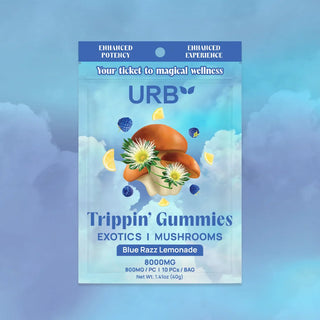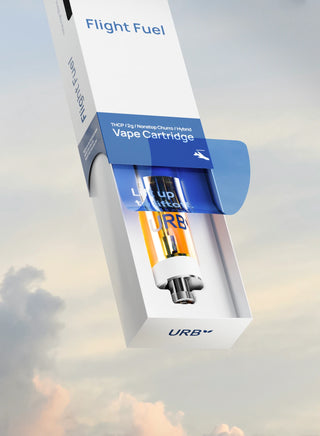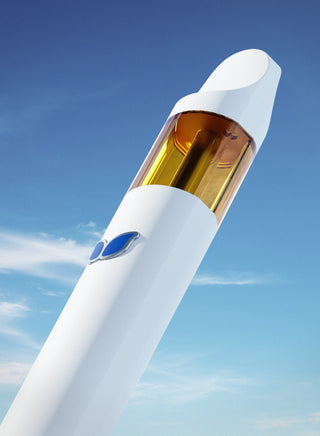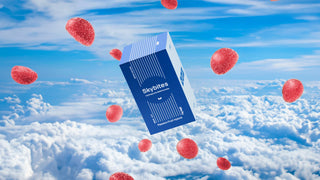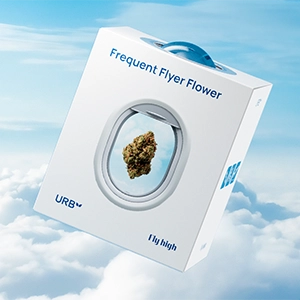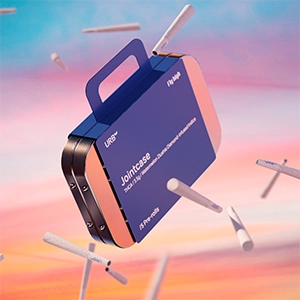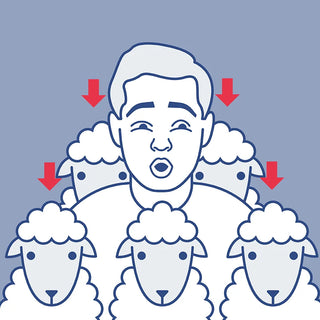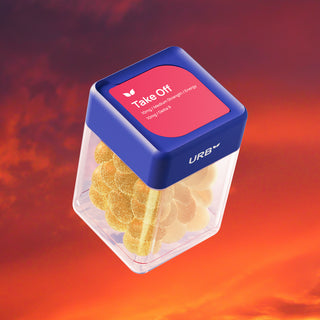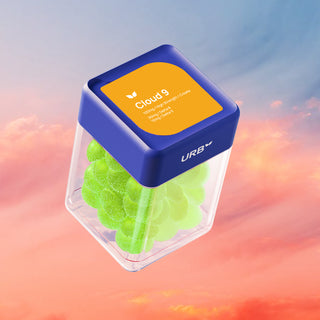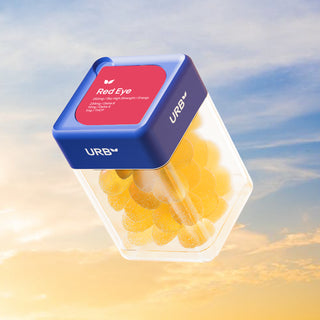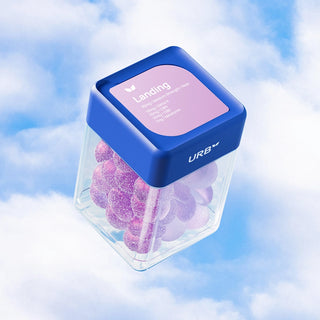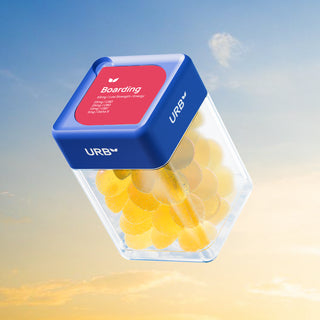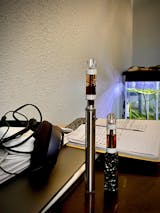Searching for something a little different than THC and CBD? Though they’re not exactly yesterday’s news, there’s much more to the wide world of cannabinoids found in the cannabis plant. CBC is one such standout. While the compound has been making headlines for the last couple of years, some research suggests that it may contribute a great deal to the overall cannabis experience.
Little-known until recently, CBC is not considered intoxicating in and of itself. Still, it plays a big role in the entourage effect, leading to this minor cannabinoid having very major potential. But we’re not here to hype; we’re here to help guide.
What This Post Will Cover
Follow along as we unravel the story of CBC and why it’s quickly rising in popularity across the cannabis and hemp market. We’ll go over all the important details, including:
-
What is CBC (and where it comes from)
-
Legal status
-
Effects & potential benefits
-
CBC’s role in the entourage effect
…and much more. So if you're curious about what’s beyond the big two cannabinoids, get ready to zoom out. Ready for takeoff?
What Is CBC?
Otherwise known as cannabichromene, CBC is a non-intoxicating cannabinoid naturally found in cannabis and hemp. After THC and CBD, it is the third most abundant cannabinoid in the plant. It’s produced by a complex string of enzymatic reactions.
CBC starts its life as CBGA—often called the “mother cannabinoid”—which can develop into different compounds, including one called CBCA (cannabichromenic acid). When the plant is heated—through vaping, smoking, or baking—CBCA transforms into CBC in a process known as decarboxylation. It's similar to how THCA turns into THC, but without the intoxicating effects.

While CBC was first identified in 1966, it’s just now gaining some traction. On the molecular level, CBC’s structure is similar to THC and CBD, but there are a few a key differences: Unlike THC (and to a lesser extent CBD), CBC does not readily bind to CB1 receptor cells, which are vital players in the endocannabinoid system (ECS), a crucial network that helps regulate memory, immune function, and more.
Instead, CBC interacts with CB2 receptors as well as lesser-known sites called TRPV1 and TRPA1, which help modulate inflammation and pain perception.
CBC vs THC vs CBD
If you're expecting CBC to deliver the kind of heady, euphoric lift you’d get from THC, you might be underwhelmed. But, that's kind of the point. Unlike THC, CBC isn’t intoxicating. It offers a more subtle, grounded experience that’s closer in feel to CBD. Think of it less like a rocket launch and more like a gentle glide.
The effects usually lean calm, centered, and supportive—noticeable, but not overwhelming. We’ll dig deeper into what those effects actually feel like, but rest assured: CBC brings something unique to the table.
Is CBC Legal?
Cannabinoids such as CBC occupy a gray area when it comes to legality. Though it’s the third most abundant compound found in cannabis after THC and CBD, cannabis plants aren’t typically its primary source. Instead, it’s more common for CBC to come from hemp, where its precursor, CBCA, is extracted into raw hemp oil and then decarboxylated into CBC using heat.

Under the 2018 Farm Bill, hemp products containing <0.3% THC by weight are federally legal. However, some states have banned the sale of hemp products, even if they do not contain intoxicating cannabinoids. If you’re in doubt, consult the local laws where you live to see if CBC in weed or hemp is allowed.
At URB, we take compliance seriously. All of our products—including those featuring CBC—meet federal legal standards and undergo thorough third-party testing. Every product comes with a Certificate of Analysis (COA) because transparency and trust are part of The URB Standard. We wouldn’t offer anything we wouldn’t use ourselves.
CBC Effects: How Does It Feel?
When it comes to the effects of specific cannabinoids, some compounds get to be the stars of the show, while others play supporting roles. While CBC effects put it in the second category, it’s still a crucial compound that keeps the whole performance running smoothly.
CBC typically comes on as uplifting, calming, and decidedly non-intoxicating. For many, they turn to this gentle cannabinoid as a way to enhance mood and put some focus in the day. And while even CBD tends to produce a soothing, relaxing feeling, CBC is sometimes described as being more neutral and grounded, with little sedation to be found.
It’s the kind of cannabinoid that doesn't shout. Instead, it subtly shapes the tone of the experience, helping bring harmony without overwhelming the senses. That tends to make it a great companion for daytime use, especially when you’re seeking mental clarity without a heavy body feel.
What Are the Potential Benefits of CBC?
On its own, CBC seems to do very little for us on a subjective level. But when we think of it being in a supportive role, we begin to unlock its mysteries. There’s good evidence that CBC contributes to the cannabis experience as a whole, and that behind the scenes, CBC is doing some heavy lifting on our behalf.
-
Pain & Inflammation: Current research suggests that CBC may have a therapeutic effect on inflammation, showing some promise as a non-psychoactive treatment for inflammatory disorders with a better safety profile than many current approaches. CBC may also act as an analgesic, helping to reduce pain by suppressing our body’s pain signals and also by keeping endocannabinoids, such as anandamide, on the job for extended periods of time.
-
Skin Support: Since many skin conditions, such as eczema and psoriasis, are now recognized as inflammatory responses, it makes sense that CBC might be beneficial here, a theory already supported by recent studies.
-
Brain Support: Several cannabinoids show potential to help support brain health. There’s some research that CBC goes above and beyond, serving as a potential neurogenesis enhancer to foster the growth of neurons and potentially playing a role in brain and spinal cord regeneration, too.
-
Mood Support: CBC may support mood by helping to increase levels of anandamide, our body’s natural “bliss molecule.” Instead of producing a euphoric high, CBC works behind the scenes to keep this feel-good neurotransmitter active in the body for longer, potentially promoting a calm, balanced emotional state.
While more research is needed, what we do know positions CBC as a quiet powerhouse, working in the background to support the body’s natural systems without the intensity of more well-known cannabinoids. It may not steal the spotlight, but when it comes to delivering a more balanced, elevated cannabis experience, CBC is absolutely part of the ensemble.
CBC Safety—Are There Side Effects?
Like many still-emerging cannabinoids, there haven’t been large-scale human trials to determine CBC’s overall safety profile. As for the potential negative side effects of CBC, some recent research from 2024 suggests that it’s actually well-tolerated in conjunction with other compounds, including CBD and THC. That said, we always urge caution when trying new compounds, as there’s always a possibility that you may experience side effects common to other cannabinoids. Though generally mild and rare, these can include nausea, diarrhea, dry mouth, and dizziness, especially in large doses.
Product quality and transparency also matter. At URB, we provide third-party lab testing for every product we make, so you can verify exactly what’s in it, how it was made, and how it meets federal compliance standards.
CBC’s Natural Gift: The Entourage Effect
You may have heard about the entourage effect, the idea that cannabinoids, terpenes, and other plant compounds work better together than in isolation. CBC is believed to contribute to the effect, especially when paired with terpenes like caryophyllene and humulene. These interactions may subtly influence mood, reduce inflammation, or enhance the calming effects of other cannabinoids.
As research unlocks more secrets of this fascinating cannabinoid, there’s a good chance you’ll see it used in combination with THC and other compounds for more targeted results.
CBC Edibles and Other Functional Products
CBC is most commonly found in functional formats like gummies, tinctures, softgels, and other products designed for slow, steady release and longer-lasting effects. These formats are especially popular for those looking to ease into cannabinoids without inhaling. A few things to keep in mind when exploring CBC edibles:
-
Onset Time: Unlike vaping or smoking, edibles take longer to activate. Effects may begin anywhere from 30 minutes to 2 hours after consumption, depending on your metabolism and whether you've eaten.
-
Duration: Once they kick in, effects typically last 4 to 6 hours, and in some cases, even longer. That makes edibles a great choice for sustained support throughout the day or night.
-
Entourage Effect: In well-formulated products, CBC is often paired with other cannabinoids like CBD, CBG, or even low doses of THC to enhance mood, balance effects, and promote overall synergy.
-
Non-Intoxicating: CBC is non-intoxicating on its own, meaning it won’t cause a high, making it ideal for those looking to stay clear-headed while still feeling supported.
Whether blended into a full-spectrum gummy or formulated into a calming tincture, CBC continues to show up in products designed to do more than just taste good; it’s there to help round out the experience.
One place you can experience CBC is in our Boarding Skybites, where the cannabinoid lends its subtle mood-enhancing lift to CBD and CBG, another cannabinoid recognized for its potential to soothe stress.
How Much CBC Should You Take?
As with many cannabinoids, there’s no one-size-fits-all dose for CBC. What works best can vary widely from person to person, depending on metabolism, tolerance, and other factors. CBC is a non-psychoactive cannabinoid, so we suggest starting with a small amount, either a fraction of an edible or just a slight inhale from a vape, to assess the effects before you redose.
How do you know if you’re getting the desired effects? One easy way to track them is with a cannabinoid journal where you can note your dosage, effects, duration, and other vital stats. It’s a seamless way to keep on top of your progress, your goals, and any issues you feel you should address in terms of getting the benefits you’re seeking.
Finally, only consume verified, third-party tested products with clearly labeled cannabinoid contents and a Certificate of Analysis. They’re your best guarantee for getting the specific cannabinoids you’re seeking in a safe, clean, and lab-tested format.
Will CBC Show Up on a Drug Test?
For those subject to drug testing, it’s natural to wonder whether non-intoxicating cannabinoids like CBC might trigger a positive drug test result. Most standard drug tests are designed to detect THC metabolites, not CBC or other non-psychoactive cannabinoids. On its own, CBC is not structurally similar to THC and is unlikely to trigger a positive result.
Of course, drug tests vary in sensitivity, and many CBC-containing products are formulated alongside other cannabinoids, including small, legal amounts of THC in some cases. Even trace levels could potentially accumulate in the body with regular use. If you're preparing for a drug screening and want to avoid any risk, the most cautious approach is to pause all cannabinoid use in the weeks leading up to the test. When in doubt, check the product’s certificate of analysis (COA) and consult with your healthcare provider for guidance.
CBC at URB: Small Cannabinoid, Big Impact
While CBC doesn’t produce a high on its own, its role in the cannabis experience is far from minor. As research grows, this non-intoxicating cannabinoid is gaining attention for how it interacts with the body—and with other cannabinoids—in meaningful, functional ways. Whether it’s supporting mood, enhancing the entourage effect, or contributing to balanced blends, CBC brings something uniquely valuable to the table.
Discover balanced, expertly formulated cannabis experiences and explore our full lineup of thoughtful cannabinoid and terpene blends.
CBC Cannabinoid FAQs
What is CBC in cannabis?
CBC, short for cannabichromene, is a non-intoxicating cannabinoid found in cannabis and hemp. It’s considered the third most abundant cannabinoid after THC and CBD and plays a supportive role in the entourage effect.
Is CBC intoxicating?
No, CBC does not produce intoxicating effects like THC. Instead, its impact is often described as calming, balanced, and clear-headed: closer to CBD than THC.
What are the potential benefits of CBC?
Early research suggests CBC may help support mood, manage inflammation and pain, encourage skin health, and even promote neurogenesis (the growth of new brain cells). While more studies are needed, CBC is seen as a promising wellness cannabinoid.
Is CBC legal?
CBC is typically derived from hemp, making it federally legal in the U.S. under the 2018 Farm Bill if it contains less than 0.3% THC. However, some states restrict hemp cannabinoids, so it’s important to check your local laws.
Will CBC show up on a drug test?
Standard drug tests look for THC metabolites, not CBC. On its own, CBC is unlikely to cause a positive test. However, some CBC products may contain THC or related compounds like Delta 8 or Delta 10, which do typically show up on standard drug panels that screen for THC.
